SUSPENDED ANIMATION #256

Uncle Scrooge was created by Carl Barks in 1947 for a story in Dell Comics Four Color Comics #178.
By 1952, Scrooge McDuck, created by Carl Barks, had become such a popular character that he was appearing in his own best-selling DELL comic book series.
At the height of his popularity in the 1950s, he came to the attention of the Disney Studios where Jack Hannah was the director in charge of the “Duck” unit and turning out memorable Donald Duck short theatrical cartoons.
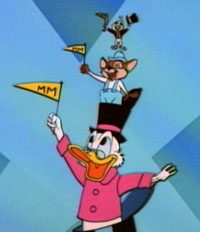
Scrooge first appeared in animation during the opening title for The Mickey Mouse Club (1955)
“It was at the time that we were also stopping production on the shorts so that ended any further discussion. Even though he was very funny in comic book form, we decided he wasn’t strong enough at the time.”
Author and noted animation historian Michael Barrier discovered during his research at the Disney Archives when it was still open to credible scholars outside the Disney Company that, at one point in 1955, there was the possibility Uncle Scrooge theatrical short written by Barks.
Ken Peterson joined Disney in 1936 as an assistant animator and, by the early 1940s, was the head of the Art Department. He was the production supervisor on several films, including Alice in Wonderland, Lady and the Tramp, 101 Dalmatians, and Sleeping Beauty.
In early January 1955, he phoned Barks to see what his arrangement was doing comic book work for Western Publishing and if he were free to submit a possible story for a cartoon short using Uncle Scrooge, since Barks had been a former Disney storyman on Donald Duck. He followed up with another letter and Barks responded several days later with a nine-page script that no longer can be found in the Disney Archives.
However, in a letter dated January 10, 1955, Barks summarized the story.
The short is meant to contrast Donald Duck’s seemingly carefree life as a worker at Scrooge’s Money Bin while Scrooge himself, because of his obsession with money, lives a stressful life.
As the cartoon begins, Donald Duck is in his comfy bed, surrounded by every modern convenience. When the alarm rings, he simply presses a few buttons, and his breakfast is cooked for him at his bedside. He doesn’t even have to get up to eat.
He rides to work and the narrator points out that he is covered by insurance if he gets sick and that another type of insurance will care for him if he loses his job.
At the Money Bin, Donald operates a money sorting machine but it is so efficient that all he has to do is just sit and monitor the activity as the coins drops out of various pipes into the machine and then into their respective tubes to a musical accompaniment.
Scrooge is a stern boss who fusses over his ledgers while keeping one ear listening to make sure the off-stage plunking of coins is continuing at a steady rhythm. He makes sure that Donald does not leave one second before the noon lunch bell.
Donald collects his morning wages as he leaves for lunch and rushes to a car dealer down the street where he puts part of the money toward a down payment on a shiny little red sports car. He eats lunch at a dining car café that is crowded, noisy, and filled with happy people. The cook says that happy, unworried people have better digestions.
By contrast, Scrooge hunches over his desk eating a meager meal of crackers and cheese that he bought at a bargain price. He comforts himself that he saves his money and now has three cubic acres of it. However, he is distracted from his lunch by news on the radio of a plague of rats loose in the city.
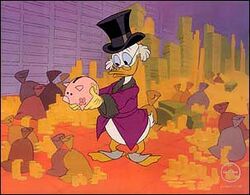
Scrooge starred in his first animated featurette, “Scrooge McDuck and Money” in 1967.
The rat rattles the shutters, bangs the door and tries by various gag means to get inside. Scrooge gulps his meal hurriedly. The rat does indeed get in and a series of humorous interactions finally ends with Scrooge cornering the rat and cocking his gun to dispatch the pest.
The clever rat holds up a $10,000 bill in front of it as protection and when Scrooge looks down the gun barrel and sees the denomination on the bill, he hesitates in fear. He turns the gun around to use as a club and the rodent sticks the bill between the teeth as a threat to shred it. The rat gestures toward the cheese and a defeated Scrooge gets him some in exchange for the bill.
However, the rat overplays its hand by turning down a variety of cheeses as too cheap for his refined taste. Scrooge has to order the most expensive cheese in the world, Odora De Pungento, which must be brought from a secret mountain cave in an armored car and served to the rat on a velvet cushion accompanied by trumpet fanfare.
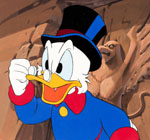
Scrooge starred in the 1987 TV series “DuckTales”
Scrooge explodes in a wild fit, much like Donald Duck, and the rat escapes. Donald comes back from his lunch content, stuffed and cheerful. Scrooge hiccups and drinks a bicarbonate of soda.
When Barks visited the studio later that month, he saw that the storymen had not used this story premise but come up with their own story of Scrooge and Donald.
Peterson told Barks, in a letter on February 14th, 1955 that they might still be interested in his script. On May 6th, 1955, Peterson returned Barks script and told him that the studio was moving more into television and away from theatrical shorts.
Barks later told Barrier that reviewing the script that it just did not have enough action and even jazzing it up with a flood of rats wouldn’t have helped. In fact, adding more rats would have added significantly to the cost of animation. He never used the story as a basis for a comic book story.


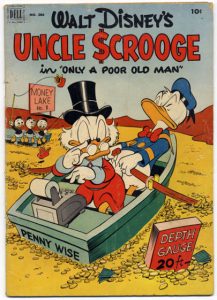
 Jim Korkis is an internationally respected animation historian who in recent years has devoted his attention to the many worlds of Disney. He was a columnist for a variety of animation magazines. With his former writing partner, John Cawley, he authored several animation related books including The Encyclopedia of Cartoon Superstars, How to Create Animation, Cartoon Confidential and Get Animated’s Animation Art Buyer’s Guide. He taught animation classes at the Disney Institute in Florida as well as instructing classes on acting and animation history for Disney Feature Animation: Florida.
Jim Korkis is an internationally respected animation historian who in recent years has devoted his attention to the many worlds of Disney. He was a columnist for a variety of animation magazines. With his former writing partner, John Cawley, he authored several animation related books including The Encyclopedia of Cartoon Superstars, How to Create Animation, Cartoon Confidential and Get Animated’s Animation Art Buyer’s Guide. He taught animation classes at the Disney Institute in Florida as well as instructing classes on acting and animation history for Disney Feature Animation: Florida.
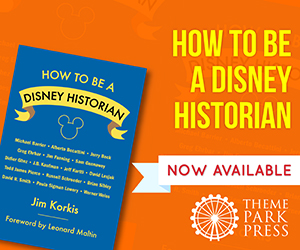



















































So the poor, overstressed capitalist has to suffer privations and fend off hungry rats while the spoiled, lazy, profligate workers live the easy life? Sound like a cartoon John Sutherland might have made for Harding College.
I’ve always felt the thrust of these stories was less “poor, put-upon Scrooge” and more “Scrooge causing himself distress because he can’t/won’t stop behaviors that are no longer necessary”.
As David Gerstein is likely writing at this very moment, Barks’ cartoon short idea did become a comic book story, posthumously. The mouse holding money hostage angle got adapted into “Rodent’s Ransom” by Daan Jippes in 2001, and saw English publication in 2004’s Uncle Scrooge #335.
This abandoned script was reused for a comic book story in 2001, one year after Barks’ death, with art by Daan Jippes, as “Rodent Ransom”. It was published in the U.S. in 2004 in Uncle Scrooge #335 (Gemstone): https://inducks.org/story.php?c=D%2FD+2001-021
From that description, it feels like the cartoon would have ended up going longer than the average seven minutes. Perhaps Bark was so used to writing for comic books at this point, where the pacing is a little more leisurely, that he failed to account for the limited time length of an animated short, which necessitates a streamlined, fast-paced plot.
What’s funny on the page is not necessarily funny on the stage (or the screen) but it’s good place to start. I always, as a kid, wondered why Scrooge was not in the cartoons.
In Don Ault’s 1975 video interview with Barks, Carl said that Scrooge is anything but a capitalist, because he doesn’t put his money to work, he hoards it.
And it’s absolutely right. That’s the big misunderstanding about McDuck – he’s often seen as a symbol of capitalism but he barely takes part in economy, and the worries he gets from protecting his money certainly don’t promote that system.
Script needs more Beagle Boys.
When exactly did the Disney Company close its archives to outside scholars? Was there a specific incident that triggered this change in policy?
I know that Disney no longer authorises the use of production stills from FANTASIA in outside publications, but this has not always been the case. There’s a still of the “Rite of Spring” dinosaurs perishing in a desiccated landscape in Stephen Jay Gould’s first collection of natural history essays, EVER SINCE DARWIN (1977). I don’t believe there was ever a problem; I think that the new management (under Eisner) just wanted tighter control over the company’s intellectual property,
“I know that Disney no longer authorises the use of production stills from FANTASIA in outside publications…”
They don’t? Alamy has several publicity stills from FANTASIA available, including for book publication:
https://www.alamy.com/stock-photo-fantasia-1940-walt-disney-productions-91361763.html
https://www.alamy.com/stock-photo-fantasia-84523315.html
https://www.alamy.com/stock-photo-fantasia-1940-walt-disney-productions-91361756.html
https://www.alamy.com/stock-photo-fantasia-84523314.html
Thanks for the correction. I had read that years ago (I no longer remember where), and clearly that policy has been overturned in the meantime. I’m glad to hear it!
Besides his appearance on “The Mickey Mouse Club” opening sequence, Scrooge McDuck also appeared outside the comics in a Disneyland Record entitled “Donald Duck and His Friends.” The main focus of the album is a party hosted by Jiminy Cricket in honor of Donald Duck. Most of the characters who make cameo appearances–such as Huey, Dewey, and Louie, Goofy, Mickey Mouse, and Chip ‘n’ Dale–are there to sing a song for Donald, most of them, oddly enough, performed a capella. The sequence involving Uncle Scrooge is non-singing, and it is about an attempt to ship his money to the moon in a rocket. (The Beagle Boys are mentioned as a major reason for this drastic move.) Scrooge is satisfied until Jiminy points out that he hasn’t held onto any of the money for daily use purposes such as carfare. It’s an interesting little sequence. I believe the Scottish-accented voice of Uncle Scrooge was Dallas McKennon, who regularly performed many voices for Disneyland Records well into the 70’s. What’s interesting to note is that Scrooge arrives at the party with no introduction or explanation of who he is, beyond Donald’s referring to him as “Uncle Scrooge” and Jiminy’s referring to him as “Scrooge McDuck.” This tells me that he would have been a familiar enough character to most children who would be listening to the album that no explanation about his wealth or his struggles against the Beagle Boys was considered necessary.
Yet another early use of the character outside of comic books.
“The sequence involving Uncle Scrooge is non-singing”
Almost. McDuck (indeed voiced by Dal McKennon) sings Polly Wolly Doodle (something Donald is appalled about)
You’re right, there is some singing, now that you remind me, but the song Uncle Scrooge sings is “Loch Lomond” with new lyrics to express his joy of having his money safe at last on the moon. And Donald is definitely none too thrilled to hear his uncle burst into song.
While missing from Disney’s archives, Barks’ original script was not lost after it was rejected in ‘55; readable images of two of the nine pages can be found here: http://www.cbarks.dk/theshelvedcartoonsynopsis.htm
I’d love to read the entire thing, but these two pages are all I can find on the web right now. Still, it means the script survived, and must have circulated among fans at some point. Presumably Barks sold them, or perhaps they were auctioned off with other memorabilia after Barks’ death
Disney Archivist Dave Smith told me when I gleefully brought up something he didn’t know, “No body can know everything….especially about Disney.” It is a response I use when people now bring up things I never knew.
One of my joys about writing for this website is all the knowledgeable folks who generously supply more information. I never knew that the missing nine pages of Barks’ script still exist somewhere. I never knew that Dann Jippes adapted the story into a comic book story. I’m am grateful for all this information as I am sure are other readers of this site.
The Jippes story was influenced by one that Barks scripted at about the same time as the cartoon project :
http://inducks.org/story.php?c=W+WDC+171-03
And he abandoned a Gyro Gearloose story involving thousands of mice because it would have been exhausting to draw them all. Rosa finished his own version in 1990 and Jippes as well several years later. Except for the pages sketched by Barks the results are quite different. Both are interesting.
http://inducks.org/story.php?c=CX+OS+1047
http://inducks.org/story.php?c=H+89174
http://inducks.org/story.php?c=D+2006-373
Scrooge only had 1 pre-DuckTales cartoon [i mean before Eisner and Disney’s Death, so Mickey’s Christmas Carol and Sport Goofy in Soccermania doesn’t count], That being the educational short where Scrooge (whether out of character or not is up to you) teaches Hewey, Dewey and Louie about the value and importance of Money
In addition to Daan Jippes’ adaptation “Rodent Ransom” (published in the US in 2004 in Uncle Scrooge #335) https://inducks.org/story.php?c=D%2FD+2001-021
there is also another adaptation with script by Geoff Blum and drawings by Massimo Fecchi “Powerplay on Killmotor Hill” (published in the US in 2008 in Uncle Scrooge #377)
https://inducks.org/story.php?c=D%2FD+2001-006